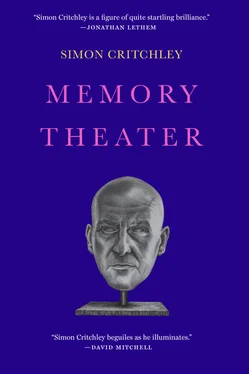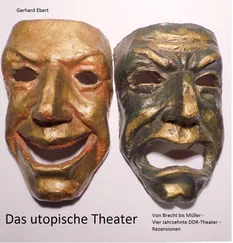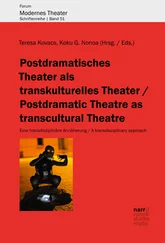I am ruined, financially. All my savings paid for the construction of the memory theater. My teaching job is pathetic and humiliating and leaves me a couple of hundred euros a month to live on. I’ve taken to growing my own vegetables and eating processed cheese. A diet that’s easy on the teeth, which are in bad shape. Look like a Beckett character. The theater is still there, though I haven’t been back inside since that day. From the outside there is a vague smell of rotting matter. Paper and papier-mâché, I imagine. Mold too. I bet the local authorities come round soon to ask questions. Very Dutch.
The hallucinations disappeared back then too. I miss them. Their company. The strangest thing was that after the events of June 13, when I woke up exhausted on the floor of the theater late that evening covered in sweat, I became instantly consumed by a fear of death, a total, grinding night-panicked terror. Timor mortis conturbat me . It never leaves me. It never ends. Never.
My fantasy was doubtless that I could coincide with my fate, rise up to meet it, unify freedom and necessity and extinguish myself from existence like a glorious firefly. Contingency would be abolished. It was the dream of the perfect death, the Socratic death, the philosophical death: absolute self-coincidence at the point of disappearance. Autarchy. Autonomy. Authenticity. Autism. It was a delusion of control. Death as some erection without procreation. An obsessional’s garden of delights. As you can see, I am still quite the thinker at times.
Things didn’t exactly work out. Maybe none of the memory maps were true. Maybe Michel just had a death wish and so did I. But it’s not death that terrifies me, but life’s continuation, its stretching into the a distance that recedes as we try to approach. No purpose, aim, or goal. That is the most difficult thing to endure. Not death, but dying. Death will happen. Yes. It is certain. Yes. But not now, and life cannot be consumed in the now. The now of nows. It is forever not now. Even if I hanged myself I would not experience a nihilating leap into the abyss, but just the rope tying me tight, ever tighter, to the existence I wanted to leave.
I didn’t want total recall. I wanted to kill my memory by controlling it. Now, my memory lives and it kills me. Each man counts his rats.
I dreamed of the void, of the controlled leap into oblivion. But now everything is packed and swarming. The void has destroyed itself. Creation is its wound. We are its drops of blood. The world is the grave in which it rots.
There is a persistent light drizzle over the Brabant heath. I see the dunes in the distance and think of rivers swelling and debouching into the vast gray North Sea.
Some time passed. Years. I decided to write things down. The grotesque scale of the error I had made gradually became clearer to me. What I had built in my Dutch backyard was a flat literalization of the idea of the memory theater. It was a sort of static, inert, dead rendering of an entity that had to be multidimensional, mobile, and somehow alive. Not literal, but metaphorical. Like those guys I saw at Venizelos Airport in Athens with metaphora written across their backs. Memory had to be transportation. Motion. I had misunderstood history as some kind of cocktail of personal whining and the history of philosophy. This was finally dull and sad. Any life is dull when looked at in the certain light. That’s why a true memory theater has to be something else.
I went back to Yates’s Art of Memory and reread it intensely, marking passages boldly in different colored inks (yellow and green highlighters, red and black Uni-Ball Vision pens). I also found a photocopy of Michel’s essay on Hegel in the bag of stuff that I’d brought from New York. The brilliance of Hegel’s insight was not to reduce memory to a kind of dull recitation of the past, but to create something permanently moving. A wheel that turns, returns, and turns again. Hegel’s memory theater was a kind of perpetuum mobile , a permanently moving loop. Knowledge of the Absolute, achieved through recollection, was a vast living organism, a totality endlessly creating novelty out of itself.
Everything that I had done — and Michel too with his damned memory maps — was too two-dimensional. Too flat. Like this fucking landscape. Memory is repetition. Sure. But it is repetition with a difference. It is not recitation. It is repetition that creates a felt variation in the way things appear. Repetition is what makes possible novelty. This is what Mark E. Smith meant. Memory needs to be imagination. Transfiguration. Now, I saw it. The whole thing. An endlessly re-creating, reenacting memory mechanism. A rotating eternity. Self-generating and self-altering.
We do not make ourselves. We cannot remake ourselves through memory. Such was the fallacy driving my memory theater. We are not self-constituting beings. We are constituted through the vast movement of history, of which we are the largely quiescent effects. Sundry epiphenomena. Symptoms of a millennia-long malaise whose cause escapes us. Memory theater cannot be reduced to my memory, but has to reach down into the deep immemorial strata that contain the latent collective energy of the past. The dead who still fill the air with their cries. The memory theater would have to immerse itself in the monumentally forgotten. Like a dredging machine descending down through the lethic waters of the contemporary world into the sand, silt, and sludge of the sedimented past. I had seen a machine like that once on the Essex coast. I watched it for hours. Dredging mud. The clanging noise it made. Water slipping through its metal teeth.
The problem with my memory theater was that it was a theater of death and it would die with me. What was the point of that? The new machine would continue forever. Forever repeating. Forever innovating. Not just the same. It would be an artifice, sure, a simulacrum, undoubtedly, but infinite and autonomous. Its autonomy, not mine. Not the same mistake again. It would be the perfect work of art. It would continue without me, in perpetuity. Endlessly. Eventually, it would be indistinguishable from life. It would become life itself.
I had to begin again.
Somewhere else. Somewhere remote. This place was no good. Isolation. An island, perhaps. But which one? There are so many (wasn’t I from an island?). At the very least I would need a contained environment. Somewhere small. It would involve a huge amount of work. This would not be another static memory theater, but a living machine whose power would be generated by the constant ebb and flow of tides. Moon powered. I began to make little drawings in crayon for a kind of cinematic projection system. I needed to find visual, moving analogues to the entirety of world history that could be projected onto a specially prepared landscape. This would be a kind of garden, but with all the trees stripped down to expose their roots and a specially prepared black grass on a series of narrow terraces that would progressively soak up the projected images. And then project them back. Paradise. But in reverse. An Eden containing all that falls. Long after my death, all the elements of world history would combine with this garden and form an artificial but living organism. I could see it very clearly. A machine that would use history to generate nature. It would be like a second fictional sun in the universe. Finally, it would become the true sun.
It was dawn. Light rain. Dull. I rode my bicycle into Den Bosch and waited for the local library to open. 5:00 a.m. Four hours to wait. I needed to consult tidal charts.
Читать дальше












